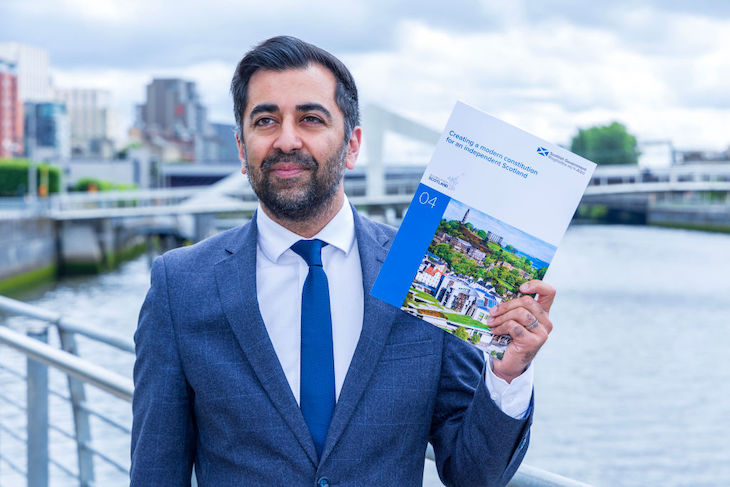Even with Nicola Sturgeon politically hors de combat, Scotland’s first minister Humza Yousaf has made it clear he intends to forge ahead with her plans to hold a second independence referendum. The Scottish government has produced its blueprint for the future constitution that could flow from such an independence vote. Any voter contemplating taking up Humza’s offer and voting Yes in a possible Indyref2 would do well to read this document closely. They could be letting themselves in for a great deal more than they thought.
Put simply, the plan is to make the SNP’s soft-left Bruntsfield-style ideology an almost irremovable feature in Scottish public life. A lot will be familiar. The incredibly generous franchise (all residents, whatever their nationality, and children over 16) would be entrenched. A coy proposal to ‘consider whether the size and composition of the Scottish parliament needed to change to reflect the additional responsibilities of independence’ translates into a predictable promise of big increases in the number of politicians and apparatchiks on the public dime. The CND-lite policies of the SNP would be cemented in: in line with a commitment to ‘supporting and promoting nuclear disarmament,’ there would be an overt constitutional prohibition on nuclear weapons in Scotland.
In the brave new Scots world, all sorts of new constitutional – and therefore legal – entitlements would appear. These include not only the kind of abstractions beloved of human rights academics – for instance, equality, human dignity, public participation, and protection of something called the ‘natural and cultural environment’ – but a good deal more. On the Caledonian constitutional menu are also, it seems, rights to free healthcare, to economic, social and cultural benefits, and to environmental protection – not to mention a community right to land ‘rooted in a human rights-based approach to land rights’ (put more simply, hostility to landowners).
In the brave new Scots world, all sorts of new constitutional – and therefore legal – entitlements would appear
All these matters would, save for the possibility of a constitutional amendment – which it seems would probably require a full-scale referendum – be largely removed from the ordinary political process. This is deeply concerning. Scots voters need to ask themselves whether they prefer vital questions of economic and social welfare – and the nature of Scotland’s defence capability in an increasingly dangerous world – to be decided directly by elected representatives rather than constitutionally bunkered so that any changes potentially require alterations to the constitution.
Just as worrying is the clear contemplation of a corresponding expansion in judicial power. There is a tentative suggestion for a full-scale constitutional court; this might be armed, one suspects, with an implicit roving commission to dictate constitutional virtue to elected politicians, rather as the UK Supreme Court did in the 2019 prorogation case. Much the same goes for the proposal to put other controversial matters, such as the environment, into the constitutional sphere. Such a measure involves a shunting over of a great deal of social and economic policy from political to judicial determination: it presages a return to exactly the kind of kind of technocratic and judicial control that was all too much a feature of the EU bureaucracy (which, to be fair, is a form of government welcome to a good deal of the SNP top brass, if not to its voters).
And this is without the human rights side. Once known as the proud home of rationalism and the Enlightenment, Scotland must now, we are told, be ‘a world leader in incorporating, implementing and advancing equality and internationally derived human rights obligations in Scotland’s constitution and beyond.’ The European Convention on Human Rights (ECHR), for example, would it seems be not only enacted as part of Scots law but constitutionalised. As a result, it would be immunised to legislative interference, even where there was overwhelming public support for the proposed change. To this would it seems be added a number of further measures, such as a constitutional requirement to advance equality of opportunity, to promote substantive equality, and to foster ‘good relations’.
As if this was not enough, all sorts of other UN treaties currently binding on the UK only on the international plane – such as the UN Convention on the Rights of the Child and the International Covenant on Economic, Social and Cultural Rights – might well find themselves incorporated in the domestic Scots constitution and binding on domestic Scots courts.
Liberal and enlightened, you say? Not really, once you realise what is involved. It’s not simply the fact that that any transfer of decisions from politicians to courts amounts to a retreat from democracy which needs careful watching. Constitutionalising the ECHR and other treaties in practice is likely to transfer worrying amounts of power outside Scotland entirely. The ECHR is enforced by a court in Strasbourg. And UN human rights treaties are constantly being reinterpreted by UN functionaries – often in an overwhelmingly interventionist and leftward direction.
Making national judges follow those developments in the absence of a constitutional amendment is, to put it mildly, delivering an enormous hostage to fortune. We already see the oddness of the SNP’s Europhile desire to escape the control of London only to exchange it for that of Brussels: we now see it equally willing to surrender yet further power to people in Strasbourg or Geneva.
The Scottish government and Humza Yousaf say they are are very keen on the idea of a Scottish constitution ‘based on the sovereignty of the people’. If they get their way and hold Indyref2 (admittedly increasingly unlikely), Scottish voters will have an excellent opportunity to take them at their word. The advice is simple: if Scots want to preserve their sovereignty and their right to control their own destiny through their elected representatives, all they have to do is vote No.






Comments